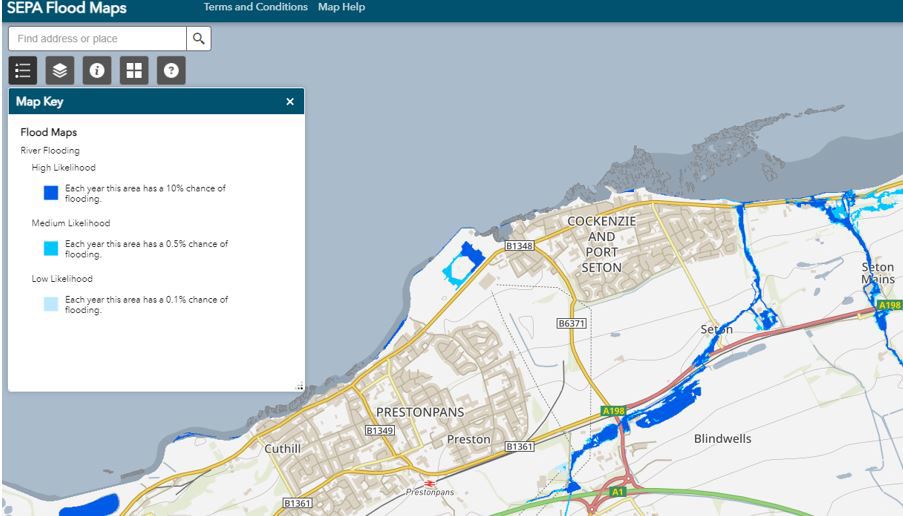It is that time of year when adverse weather conditions impact housebuilders’ construction work; affecting programmes and causing delays.
It can be useful to be alert to tools that can help manage the situation and inform due diligence, planning and contract terms from the outset.
It will come as (s)no(w) surprise that the weather in Scotland is not always the most conducive to building homes. Recently, the country has been hit with snowstorms and very low temperatures. Then as temperatures rise, the snow melts, rain falls, and parts of the country are flooding.
As with any business, planning for contingencies is key. Being prepared for winter flooding and understanding your flood risk are important. Are you aware of how easy it is to stay up to date with the current situation?
It is very simple. Use these tools available from the Scottish Environment Protection Agency (“SEPA”):
- Flood Updates – SEPA Floodline: live flood alerts and warnings available via interactive links for the relevant area. You can even sign up for live updates and there are details for your local Floodline.
- Scottish Flood Forecast | Thursday 07 December 2023 (sepa.org.uk): this flooding forecast information alerts you potential risk over the next three days.
Those tools help with current issues but what about using them to inform acquisition decisions, pricing and contract terms? The SEPA tools can play a part in planning ahead. You might already review SEPA’s dedicated Flood Maps for developers. If not we can do that as part of our diligence review. By using the interactive map we can view and report on the likelihood of flooding in particular areas. This is an example for East Lothian.

If flood risk can be identified at the outset it can be factored into buying strategies and option agreements. There are various points to consider including future marketability since areas with high flooding risks can be problematic in terms of obtaining insurance not just for development but for future homeowners too. Localised flooding and surface water is off putting for purchasers, making the development less attractive. In option agreements drafting can be adjusted to account for the cost of flood prevention works and the impact it will have on land values. The cost of preventative works should be included in your abnormals.
If your site is already flooded, what can you do?
- First, take steps to manage the risk and protect your property. Ideally you should prepare for a flood so you can minimise any damage or disruption caused to your own and neighbouring property.
- Understand which other bodies have responsibilities for flooding. SEPA is responsible for flood forecasting, warning and is the strategic flood risk management authority advising on flood risk management. Local authorities and Scottish Water are responsible for local flood risk management plans. Local flood risk plans can be found here: Flood Risk Management Plans | SEPA. Contact the relevant body for advice and to collaborate on a flood management plan.
- Think about the impact of the flood on your contractual obligations and particularly timescales. If you are likely to have delays do you have any duties to notify contractors or suppliers? What will be the consequences or costs of any delays?
- Contact your insurance to alert them to the issues. You may need to make a claim if the damage is severe.
Burness Paull’s real estate, planning and construction teams are happy to discuss how we can assist you to consider flood risk at an early stage through diligence, planning requirements and contractual terms drafted to factor in future risk of flooding. Please do get in touch if you would like more information on this.
Related News, Insights & Events
Error.
No results.

Property Risk Conference - Navigating Change in Commercial Property
05/03/2026
Join us for our property risk conference, a morning seminar bringing together legal and industry insight on the key risks and opportunities shaping the commercial property sector.

Commercial lease break notices: tips and pitfalls
25/02/2026
This blog explores commercial leases from the customer and supplier side, with a focus on exercising a break notice.

Leasehold reform in England and Wales… and the position in Scotland
19/02/2026
Here, we examine proposed leasehold reform in England and Wales and why Scotland’s distinct property system means the changes will not apply north of the border.
{name}
{properties.pageSummary}
{properties.eventName}
{properties.pageDate|date:dd/MM/yyyy}{properties.shortDescription}
{properties.headline}
{properties.pageDate|date:dd/MM/yyyy}
{properties.shortDescription}
